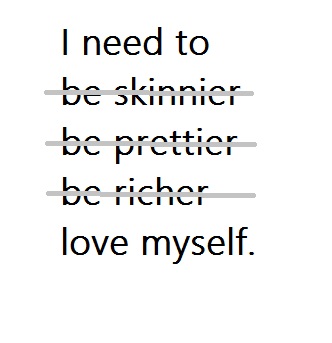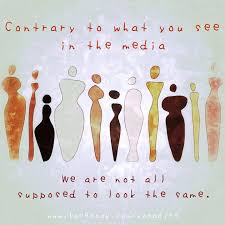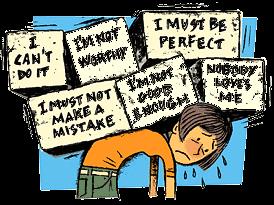What is body image?

Body image is about how and what you think and feel about your body. It includes the picture of your body that you have in your mind, no matter what is your body’s actual shape and size.
A positive or healthy body image is feeling happy and satisfied with your body, as well as being comfortable with and accepting the way you look. When you feel good about your body, you’re more likely to have good self-esteem and mental health as well as a balanced attitude to eating and physical activity.
A negative or unhealthy body image is feeling unhappy with the way you look. People who feel like this often want to change their body size or shape and can have long-lasting consequences.
Why is body image so important?

Body image is how you view your physical self — including whether you feel you are attractive and whether others like your looks.
For many people, especially people in their early teens, body image can be closely linked to self-esteem.
People with high self-esteem know themselves well. They’re realistic and find friends that like and appreciate them for who they are. People with high self-esteem usually feel more in control of their lives and know their own strengths and weaknesses.
Which factors affect body image?
Body image, whether positive or negative, is shaped by a variety of factors:
- Comments from family, friends and others about our, their, and other people’s bodies, both positive and negative
- Ideals that we develop about physical appearance
- The frequency with which we compare ourselves to others
- Exposure to images of idealized versus normal bodies
- The experience of physical activity
- The experience of abuse, including sexual, physical, and emotional abuse
- The experience of prejudice and discrimination based on race, ethnicity, religion, ability, sexual orientation or gender identity
- Sensory experiences, including pleasure, pain and illness
Many of these factors are controllable but only some of them are not. Having a healthy body image involves understanding the controllable factors and taking steps to preserve this aspect of mental health.
Negative teenage body image: risk factors

Adolescents are more likely than others to feel unhappy about their bodies. They might be more at risk of developing an unhealthy body image if they:
- Feel pressure from family, peers or media to fit into a narrow idea of beauty and attractiveness, or if family members or peers tease them about the way they look.
- Have a different body shape or weight from many of their peers, or a body shape that’s obviously different from the ‘ideal’ shapes seen in the media.
- Are perfectionists.
- Look at themselves from the ‘outside’ and worry about how others see them, or if they compare themselves to others.
- Have low self-esteem or experience symptoms of depression
- Belong to a friendship, sport or dance group that emphasises a certain body type
- Have physical disabilities.
Overweight adolescents in particular girls
Are more likely to feel negative about their bodies or have an unhealthy body image.
Effects of negative body image to adolescent
Unhealthy body image is directly related to low self-esteem, which can lead to negative moods and depression. Extreme dieting, exercise compulsion, laxative abuse, vomiting, smoking and use of anabolic steroids have all been associated with negative body image.
Adolescent who are feeling down are more likely to focus on the negative messages around them and make negative comparisons between their bodies and what they see as ‘ideal’ body image.
Adolescent with negative body image: Watch out for signs to consider seek counseling and treatment
It’s normal for an adolescent to be conscious of her body and want to look great and lead a healthy lifestyle. But when they focus too much on their bodies, it can lead to lots of anxiety and stress.
If you experience any of the following signs, seek advice from your parents, guardians or consider talking to a health professional.
You might:
- feel inadequate about or criticize your body – you might say you are ugly
- continually compare your body with others
- not want to leave the house because of the way you look
- not do activities or try new things because of the way you feel about your body
- obsess about losing weight, or about specific parts of your body, like your face or legs
- you might spend lots of time looking at yourselves in the mirror or taking photos and looking for changes or imperfections
- Link food with feelings of guilt, shame or blame.
References:
- raisingchildren.net.au/articles/body_image.html”>http://raisingchildren.net.au/articles/body_image.html accessed on 25th April 2017
- kidshealth.org/en/teens/body-image.html”>http://kidshealth.org/en/teens/body-image.html accessed on 25th April 2017
- https://www.pinterest.com/pin/156781630752121047/ accessed on 25th April 2017
- www.pinterest.com/jesse_lee/sc-confidence-self-esteem/”>https://www.pinterest.com/jesse_lee/sc-confidence-self-esteem/accessed on 25th April 2017
- shop.ucsc.edu/general-health-wellness/body-image.html”>https://shop.ucsc.edu/general-health-wellness/body-image.html accessed on 25th April 207
| Last Reviewed | : | 28 August 2020 |
| Writer | : | Dr. Rozimah Bt. Abdul Latif |
| Accreditor | : | Dr. Norizzaty Bukhary Bt. Ismail Bukhary |
| Reviewer | : | Dr. Nazhatussima bt. Suhaili |







